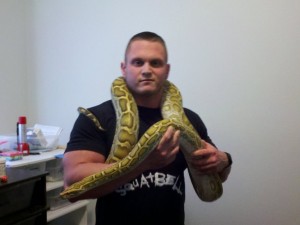Snake handler can’t charm fearful neighbors, who shut down his business

By Paul Brennan | Iowa Watchdog
AMES, Iowa — The door to the small room at the back of Kyle Thompson’s basement is locked. A sign on the door warns visitors what’s inside — snakes, more than 40 of them.
Stepping inside, the eye is automatically drawn to three massive Burmese pythons in long enclosures with clear fronts. They’re not hissing. Or writhing. Just sleeping.
Once you get past the size of the pythons, you start to realize how normal the room is. Except for the enclosures for the big three, it looks like any other a storage room with shelves stacked high with containers that resemble Tupperware.
The city of Ames has no problem with Thompson’s snakes. He could double their number if he wanted to. He cannot, by ruling of the Zoning Board of Adjustment, reduce their number by selling them.
PERMIT DENIED: The city of Ames turned down Kyle Thompson’s request for a permit to sell some of the snakes he breeds.
Because of the neighbors. Who are afraid of snakes.
“The people who objected to the permit because they don’t want snakes in the neighborhood didn’t win the victory they think they did,” Thompson said.
Thompson, who got his first pet at the age of 6, loves snakes. He cares for them like family. He breeds them, he says, “to produce rare characteristics and to diversify the gene pool, which is good for the species.”
In the two years Thompson has lived here, no snake has wandered away from the house. Only one of his neighbors, a snake owner herself, knew Thompson kept snakes.
“The snakes are in locked enclosures in a locked room in the basement of my locked home,” Thompson told Iowa Watchdog. “Animal control inspects my set-up every year and they approve. Unless the snakes learn to pick locks and work doorknobs, they aren’t going anywhere.”
Last year, Thompson began selling some of the babies he breeds on websites for snake enthusiasts to help pay for a hobby that costs almost $4,000 a year for food and simple maintenance alone.
“The goal is to break even,” Thompson said.
An animal control officer who found out in May told Thompson he needed a special occupation permit to sell snakes from his home.
Thompson applied. After inspecting his home, the city Department of Zoning and Housing recommended giving Thompson the permit. The department also sent letters to neighbors within 200 yards of Thompson’s home informing them of his application for a permit.
Thompson brought to a Zoning Board of Adjustment hearing signed statements of support from 12 of his neighbors and his landlord.
Neighbors who attended the hearing snuffed out that support.
“One woman said she was afraid a snake might eat her child,” Thompson said.
Another said she worried the snakes might endanger children at an elementary school a half-mile from Thompson’s home, although she couldn’t explain how the snakes might get there.
“Snakes need to feel secure. That’s why they’re kept in fairly small enclosures. The last thing they want to do is to go roaming around out in the open,” Thompson explained.
Thompson said he did his best to answer all the concerns that had been raised, but all three members of the board voted to reject the application.
“I don’t know how you can overcome fears when they’re not rational,” Thompson said.
Thompson has no immediate plans to move out of the city. And because he isn’t permitted to sell the offspring his snake den is only going to grow, he said.
Thompson thinks of it as an unintended consequence of government action.
“Most of the people,” he said, “were objecting to me having the snakes at all, not the business.”
Contact Paul Brennan at pbrennan@watchdog.org







